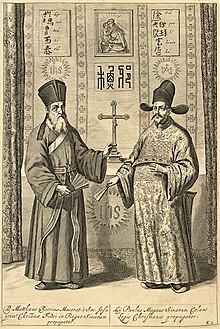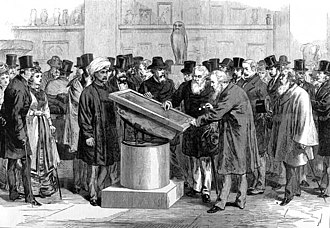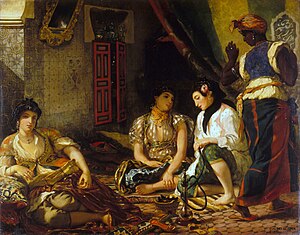Oriental studies
In the late 18th century, archaeology became a link from the discipline to a wide European public, as artefacts brought back through a variety of means went on display in museums throughout Europe.Modern study was influenced by imperialist attitudes and interests and by the fascination for the "exotic" East for Mediterranean and European writers and thinkers, and was captured in images by artists, which is embodied in a repeatedly-surfacing theme in the history of ideas in the West, called "Orientalism."[2] There was a vague but increasing knowledge of the complex civilisations of China and of India from which luxury goods (notably cotton and silk textiles as well as ceramics) were imported.The Enlightenment thinkers characterized aspects of the pagan East as superior to the Christian West in Montesquieu's Lettres Persanes and Voltaire's ironic promotion of Zoroastrianism.The interest in understanding Islam was fueled partly by economic considerations of the growing trade in the Mediterranean region and by the changing cultural and intellectual climate of the time.Although scholastic study expanded, so did racist attitudes and stereotypes of Asian peoples and cultures, however, which frequently extended to local Jewish and Romani communities since they were also of Oriental origin and widely recognized as such.The influence of Orientalism in the sense used by Edward Said in his book of the same name in scholarship on the Middle East was seen to have re-emerged and risen in prevalence again after the end of the Cold War.It is contended that was partly a response to "a lacuna" in identity politics in international relations generally and within the 'West' particularly, which was brought about by the absence of Soviet communism as a global adversary.[10] The end of the Cold War caused an era that has been marked by discussions of Islamist terrorism framing views on the extent to which the culture of the Arab world and of Islam is a threat to that of the West.Such considerations were seen to have occurred in the wider context of the way in which many Western scholars responded to international politics after the Cold War, and they were arguably heightened by the terrorist attacks of September 11, 2001."[12] The term Orientalism has come to acquire negative connotations in some quarters and is interpreted to refer to the study of the East by Westerners who are shaped by the attitudes of the era of European imperialism in the 18th and the 19th centuries.[13] In contrast, the term has also been used by some modern scholars to refer to writers of the colonial era who had pro-Eastern attitudes, as opposed to those who saw nothing of value in non-Western cultures.The generic concept of Oriental studies has to its opponents lost any use that it may have once had and is perceived as obstructing changes in departmental structures to reflect actual patterns of modern scholarship.This change of labeling may be correlated in some cases to the fact that sensitivity to the term "Oriental" has been heightened in a more politically correct atmosphere, although it began earlier: Bernard Lewis' own department at Princeton University was renamed a decade before Said wrote his book, a detail that Said gets wrong.





Ancient AssyrianBritish MuseumNear EasternFar EasternMiddle Eastern studiesAsian studiesEuropeIslamic studiesSinologyEast AsiaUnited StatesEast Asian studiesOrientAbrahamic religionsWestern culturemedieval Arabic medicinephilosophyArabicMiddle Agesimperialisthistory of ideasOrientalismGreco-Persian WarsAthenianAthenian democracyPersianDiocletianRoman EmpireAncient Persianimprecise knowledgeRoman trade with IndiaHayton of CorycusMongolsPope Clement Vspread of IslamMuslim conquestsChristendomIslamic worldMiddle EastCentral AsiaNorth AfricaAndalusiaJohn MandevillePrester JohnMarco PoloBiblical HebrewSyriacChristian literaturemedicinescienceStudia LinguarumRenaissance of the 12th centurygrowth in translations of Arabic and Greek texts into LatinConstantine the AfricanHerman of CarinthiaQur'anearliest translation of the Qur'anEuropean languagesGerard of CremonaReconquistaIberian PeninsulaCouncil of Viennevague but increasing knowledgecottonceramicsCrusadesMongol EmpireCrusader kingdomsextended diplomatic contactsAge of Explorationmapping AsiaMatteo RicciXu GuangqiEuclid's ElementsRenaissanceOttoman Empirefirst Polyglot BibleCambridge UniversityRegius Professor of Hebrewchair in ArabicEdmund CastellEdward PocockeUniversity of SalamancaJean-Baptiste ColbertFrançois Pétis de la CroixFar EastJesuit China missionsEnlightenmentMontesquieuVoltaireZoroastrianismEdward Gibbonreligious toleranceDiderotMandarinUniversità degli Studi di Napoli "L'Orientale"NaplesContinental EuropearchaeologyEgyptologyAsiatic SocietyCalcuttaWilliam Jonesclose relations between Indian and European languagesFranco–British rivalryJames MillKarl MarxJewishAsiatic mode of productionOriental despotismprogressMediterraneanVictor PlaceSargon IIKhorsabadNinevehFelix ThomasBuddhismHinduismEugene BurnoufMax Müllerstudy of Islamracistbiological sciencesSecond World WarRosetta Stone